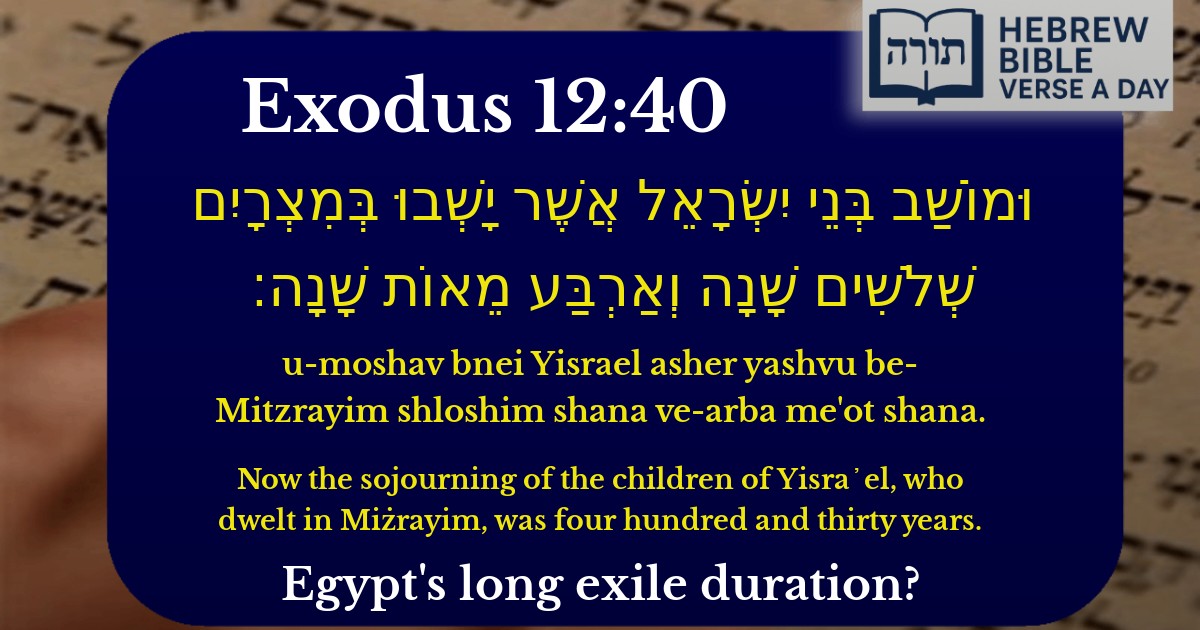Join Our Newsletter To Be Informed When New Videos Are Posted
Join the thousands of fellow Studends who rely on our videos to learn how to read the bible in Hebrew for free!
Hebrew Text
וּמוֹשַׁב בְּנֵי יִשְׂרָאֵל אֲשֶׁר יָשְׁבוּ בְּמִצְרָיִם שְׁלֹשִׁים שָׁנָה וְאַרְבַּע מֵאוֹת שָׁנָה׃
English Translation
Now the sojourning of the children of Yisra᾽el, who dwelt in Miżrayim, was four hundred and thirty years.
Transliteration
U-moshav bnei Yisrael asher yashvu be-Mitzrayim shloshim shana ve-arba me'ot shana.
Hebrew Leining Text
וּמוֹשַׁב֙ בְּנֵ֣י יִשְׂרָאֵ֔ל אֲשֶׁ֥ר יָשְׁב֖וּ בְּמִצְרָ֑יִם שְׁלֹשִׁ֣ים שָׁנָ֔ה וְאַרְבַּ֥ע מֵא֖וֹת שָׁנָֽה׃
וּמוֹשַׁב֙ בְּנֵ֣י יִשְׂרָאֵ֔ל אֲשֶׁ֥ר יָשְׁב֖וּ בְּמִצְרָ֑יִם שְׁלֹשִׁ֣ים שָׁנָ֔ה וְאַרְבַּ֥ע מֵא֖וֹת שָׁנָֽה׃
🎵 Listen to leining
Parasha Commentary
📚 Talmud Citations
This verse is quoted in the Talmud.
📖 Megillah 9a
The verse is referenced in a discussion about the duration of the Israelites' stay in Egypt, comparing the 430 years mentioned here with other biblical accounts.
📖 Nedarim 32a
The verse is cited in a discussion about the chronology of the Israelites' sojourn in Egypt and the calculation of the 430 years.


The Duration of Israel's Sojourn in Egypt
The verse states that the children of Israel dwelled in Egypt for 430 years (Shemot 12:40). However, this seemingly contradicts other calculations in the Torah, such as the fact that Kehat, Levi's son, lived 133 years (Shemot 6:18), his son Amram lived 137 years (Shemot 6:20), and Moshe was 80 years old at the Exodus (Shemot 7:7), totaling only about 350 years from Levi's descent to Egypt.
Resolving the Apparent Discrepancy
Rashi (on Shemot 12:40) explains that the 430 years are counted from the birth of Yitzchak, as the promise of exile was first given to Avraham at the Covenant Between the Parts (Bereishit 15:13). Thus, the 430 years include:
The View of the Seder Olam
The Seder Olam Rabbah (Chapter 3) similarly calculates that the Israelites spent only 210 years in Egypt, with the count beginning from the time of Yitzchak. This aligns with the statement in Pirkei Avot (5:3) that the Egyptian exile lasted 210 years.
Ramban's Interpretation
Ramban (on Shemot 12:40) offers a different approach, suggesting that the 430 years refer exclusively to the time spent in Egypt. He reconciles the timeline by proposing that the generations overlapped significantly, with Kehat living through much of Levi's lifetime and Amram through much of Kehat's.
Spiritual Significance of the Number
The Midrash (Shemot Rabbah 1:1) notes that the 430 years correspond to the time needed for the Jewish people to develop their unique spiritual identity before redemption. The Zohar (Shemot 43a) further explains that this period allowed for the refinement of the holy sparks trapped in Egypt through the Israelite presence there.